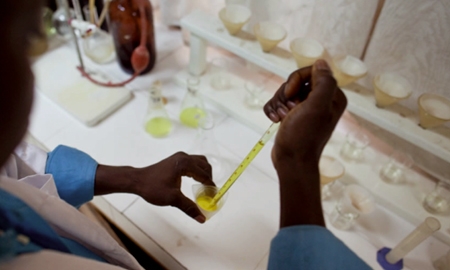Ask any Nigerian to name the brand of a top-quality flour and he or she is sure to answer “Golden Penny”, an accolade producer Flour Mills of Nigeria (FMN) can be proud of as it celebrates its 50th anniversary and sets out to lend its name and corporate expertise to many more products in a wide range of sectors.
“Our main interest is ensuring that whatever we produce is of high quality and that is our promise,” says FMN Group Managing Director Chief (Dr) Emmanuel A. Ukpabi. “We started with one flour mill and now we have 22.”
At the beginning, the company milled 600 tonnes a day at that one plant alone and this year expects to turn out 8,500 tonnes per day, making it one of the largest single-site mills in the world.
But FMN has never rested on its laurels. In addition to its food products, which along with flour currently include pasta and noodles, the group is active in cement manufacturing, transport services, agricultural production, animal feed, fertilisers, bulk seaport cargo handling and packaging.
“We recently sold 30 per cent of the bag company to the public and we export our packaging bags even to the United States. To do this you must meet international standards,” Dr Ukpabi says.
“So we are doing our best to ensure that we remain on top,” he explains, noting that Nigerians deeply respect the company and recalls that in a bond issue two years ago, FMN was seeking 5 billion naira (£20 million) but ended up raising 7.5 billion naira.
Almost as old as independent Nigeria itself, the group employs around 5,000 people and has grown along with the country. It has ambitious plans to continue expanding in its role as one of West Africa’s manufacturing and trading giants.
And it is perfectly placed to do so as the Economic Community of West African States (ECOWAS) pushes for full regional integration, although the executive cautions that conditions could improve.
Dr Ukpabi is particularly concerned with what he sees as high tariffs and cheating regarding regional import regulations. He notes that the domestic market is huge for local producers but that they still need to move goods and services to other West African countries.
“Manufacturers are very interested in cross-border trade but without unnecessary hindrances where you have to pay this and pay that,” the managing director complains.
“And we need to ensure that goods coming from participating countries are made in those countries and are not being imported there from outside the region and then shipped into Nigeria,” he adds.
Regarding Nigeria as a place to do business, Dr Ukpabi says the country has received a bad rap and that foreign investors would do well to ignore the negative publicity.
“The most important thing for people to know about Nigeria is that it is not as bad as it is being portrayed,” he argues. “It is a peaceful place, it is growing and the population is hospitable and welcomes foreigners.”
“Nigeria enjoys a growing economy with a flourishing business community and we welcome investors to Nigeria,” Dr Ukpabi says, adding that the group would be open to cooperating with foreign partners in other food products, vitamins and building materials.
Flour Mills of Nigeria backs this confidence in the country with an extensive corporate social responsibility programme, which includes donating equipment to local hospitals, helping schools, buying patrol cars for the police and making generous gifts to charity organisations.
“I often get letters from the community commending FMN for our corporate responsibility, which we see as anything that can make this country really move,” the managing director says.
Dr Ukpabi joined FMN right after university, seeing the company as the perfect corporate organisation with which to have the opportunities to grow professionally as the group itself grew.
“If you think of what Flour Mills of Nigeria was 10 years ago and what it is today, everybody marvels at the expansion in capacity, the diversification and innovation,” he says.
“I am happy that I have been a part of it and that I am leaving the company much better off than when I first arrived. We are building this company in such a way that maybe in the next 50 years it will grow into a real octopus in this country.”

0 COMMENTS